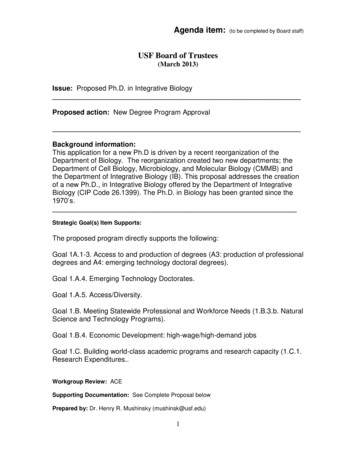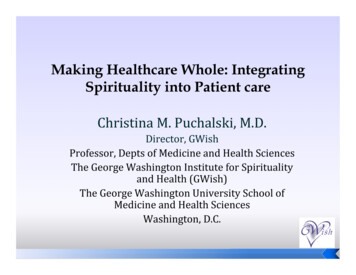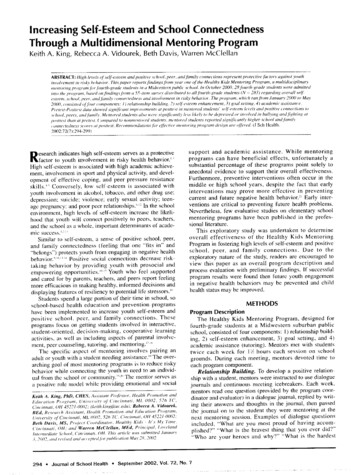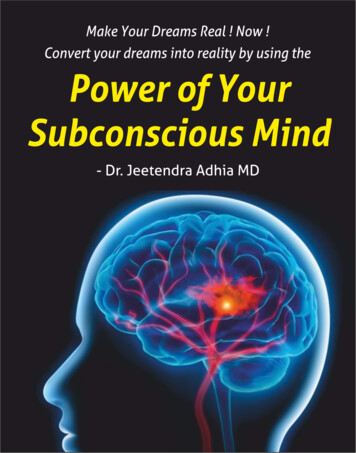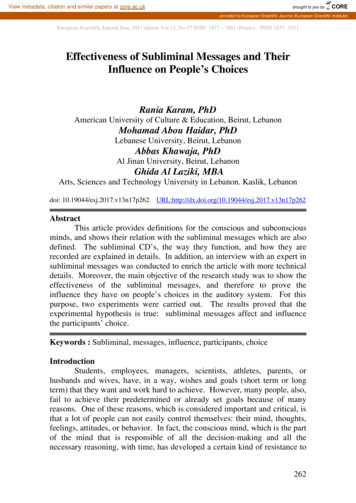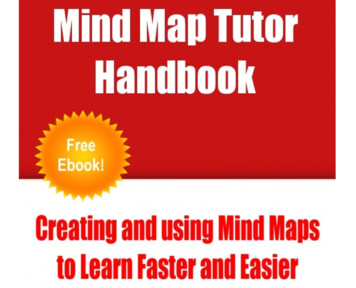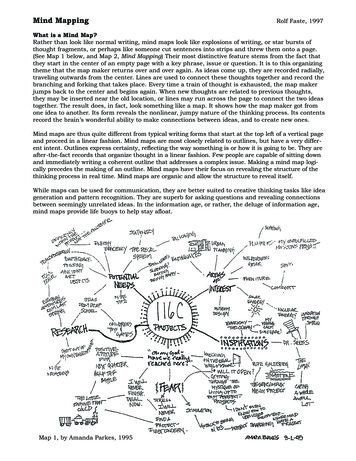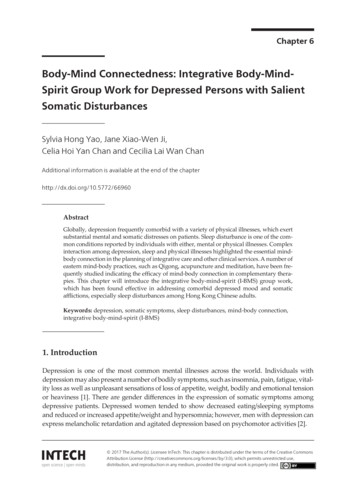
Transcription
Provisional chapterChapter 6Body-Mind Connectedness: Integrative Body-MindBody-MindIntegrativeBody-MindSpirit GroupConnectedness:Work for DepressedPersonswith SalientSpiritGroupWork for Depressed Persons with SalientSomaticDisturbancesSomatic DisturbancesSylvia Hong Yao, Jane Xiao-Wen Ji, Celia HoiYan ChanandCeciliaWan ChanSylviaHongYao,JaneLaiXiao-WenJi,CeliaHoi Yan Chan and Cecilia Lai Wan ChanAdditional information is available at the end of the chapterAdditional information is available at the end of the ally, depression frequently comorbid with a variety of physical illnesses, which exertsubstantial mental and somatic distresses on patients. Sleep disturbance is one of the com‐mon conditions reported by individuals with either, mental or physical illnesses. Complexinteraction among depression, sleep and physical illnesses highlighted the essential mind‐body connection in the planning of integrative care and other clinical services. A number ofeastern mind‐body practices, such as Qigong, acupuncture and meditation, have been fre‐quently studied indicating the efficacy of mind‐body connection in complementary thera‐pies. This chapter will introduce the integrative body‐mind‐spirit (I‐BMS) group work,which has been found effective in addressing comorbid depressed mood and somaticafflictions, especially sleep disturbances among Hong Kong Chinese adults.Keywords: depression, somatic symptoms, sleep disturbances, mind‐body connection,integrative body‐mind‐spirit (I‐BMS)1. IntroductionDepression is one of the most common mental illnesses across the world. Individuals withdepression may also present a number of bodily symptoms, such as insomnia, pain, fatigue, vital‐ity loss as well as unpleasant sensations of loss of appetite, weight, bodily and emotional tensionor heaviness [1]. There are gender differences in the expression of somatic symptoms amongdepressive patients. Depressed women tended to show decreased eating/sleeping symptomsand reduced or increased appetite/weight and hypersomnia; however, men with depression canexpress melancholic retardation and agitated depression based on psychomotor activities [2]. 2016 The Author(s). Licensee InTech. This chapter is distributed under the terms of the Creative Commons 2017 The Author(s). Licensee InTech. This chapter is distributed under the terms of the Creative CommonsAttribution License (http://creativecommons.org/licenses/by/3.0), which permits unrestricted use, distribution,Attribution License (http://creativecommons.org/licenses/by/3.0), which permits unrestricted use,and reproduction in any medium, provided the original work is properly cited.distribution, and reproduction in any medium, provided the original work is properly cited.
92DepressionDepression, together with somatic disturbances, is largely responsible for psychosocial imped‐iments of clinical patients. Somatic disturbances and depressive mood seem to be reciprocallycorrelated. The somatic symptoms, such as sleep disturbance, are certainly associated withonset and development of depression [3]. Moreover, depression has been found to increase therisk development and severity of chronic illness in longitudinal studies [4]. In both literatureand practice, the interplay between depression and somatic syndromes is not well understood.Hence, more works are required to better understand how this close association betweendepression and somatic/physical distresses can further inform existing models of depression.A great deal of studies has consistently found that insomnia can predict the onset of depres‐sion and might perpetuate the residual depression symptoms among patients in remission[5]. Some studies indicated a bidirectional relation between insomnia and depression [5].Some other studies only found a unidirectional relationship between sleep problems at base‐line and incident of depression later, but not vice versa [6]. Buysse and associates conducteda 20‐year study to understand comorbidity of insomnia and depression, and found that eitherinsomnia occurred with or without depression, it is highly stable over time if not treated [7].More importantly, it is the comorbid syndrome rather than standalone insomnia or depres‐sion tended to longitudinally relate to future diagnosis. Thus, it seems essential to considerthese two conditions under an integrative framework.With a holistic perspective, integrative body‐mind‐spirit model is an approach derivedfrom Eastern philosophies and therapeutic techniques to create positive and transformativechanges in individuals and families [8]. Randomized clinical trials have been conducted toexamine the effectiveness of this approach in treatments of depression, anxiety, posttrau‐matic stress disorders, prolonged grief and so forth [9–11]. The IBMS intervention was usu‐ally delivered in the group modality on a weekly basis. In a mixed study of effectiveness ofI‐BMS for clinical depression, researchers delivered thematic psycho‐education and breathingexercises, and guided imaginary hand massage, one-second techniques, etc., for patients withclinical diagnosis of depression [12]. After intervention, participants were able to accept theirdepression and the physical, emotional and spiritual changes caused by depression, moreimportantly, learn to appreciate and practice body‐mind connection in therapeutic contextand in their daily routines. Similar designs have found positive outcomes of I‐BMS acrossdifferent cultural contexts [13].This chapter will introduce the significance of the body‐mind connectedness in the health‐pro‐moting practices for patients with depressive symptoms. Furthermore, this chapter will alsopresent the integrative body‐mind‐spirit model and its effectiveness in reducing the depres‐sive symptoms and enhancing the overall quality of life for people with comorbid depressivesymptoms and sleep problems.2. Behavioral medicine for depression: mind‐body bridgingA reciprocal relationship between mental and physical health highlighted the significantrole of mind‐body connection in health service. An online survey on depressed patients andprofessionals even suggested that discussing mind‐body connection could help to improve diagnosis and management of depression [14]. Lots of mind‐body techniques had been
Body-Mind Connectedness: Integrative Body-Mind-Spirit Group Work for Depressed.http://dx.doi.org/10.5772/66960adopted to promote mental and physical health, including physical exercises, Qigong, yoga,acupuncture and mindful meditation.a) Physical exercisesRegular physical activities can arguably benefit both physical and mental health as showed bystudies in medicine and social sciences. Exercises have been viewed as an imperative dimen‐sion on lifestyle modifications in prevention, management and recovery of chronic illness,including depression [15]. In fact, physical exercises may be more applicable for those withmild and moderate depression who are more motivated and capable to engage in physicalactivities than those under severe conditions [16]. According to a meta‐analysis, physical exer‐cises can significantly reduce depression symptoms and improve the treatment responses.However, the efficacy of physical exercises in the treatment of depression was influenced byage and baseline depression severity [17].b) Exercise QigongQigong is an ancient Chinese mind‐body practice, originated from ancient thoughts of innerhealing and informed traditional Chinese medicine practices. It is designed to cultivate lifeforce (Qi), a vital energy that sustains holistic well‐being. Nowadays, Qigong has developedinto different schools, but most forms of exercise Qigong comprise a series of orchestratedpractices including body postures such as standing or sitting, the performance of a range ofsimple movements, breathing techniques and meditation to attain a deeply focused state ofeasiness that were addressed along the history. Besides health maintenance, exercise Qigonghas been found effective in fostering patients’ recovery from cancer and noncancer diseases.A randomized trial control study found that medical exercise Qigong could improve cancerpatient's overall quality of life and mood status and simultaneously reduced side effects ofcancer treatments [18]. Exercise Qigong has also been applied to improve neurologic, immuneand respiratory functions, which possibly associated with better health and mental health [19,20]. In terms of depression, the effectiveness of exercise Qigong in treatment of depression hasfound to be positive in Chinese context [21].c) AcupunctureAcupuncture is the insertion and stimulation of needles at specific points on the body to relievepain and facilitate restoration of health. It is a traditional medicine intervention practiced inChina and other Asian countries for thousands of years. Randomized trial studies have demon‐strated that acupuncture is beneficial to reducing symptoms of depression [22], posttraumaticstress disorders [23], postpartum stresses [24] as well as other psychosocial‐emotional problems.However, the placebo of acupuncture required further researches as indicated by a randomizedstudy that showed that placebo acupuncture significantly predicted higher overall pregnancyrate through reducing stress and anxiety levels in comparison with real acupuncture [25].d) Mindful meditationMindful meditation is derived from Buddhist practices. Comparing to “pure” meditation,the mindfulness‐centered program has its most powerful effect on reducing stress andimproving psychological health [26]. Thus, mindful meditation is a research‐based formof meditation designed to achieve moment‐to‐moment attentions to flow of experiences, amodern psychological term defined as “the awareness that emerges through paying atten‐93
94Depressiontion on purpose, in the present moment, and nonjudgmentally to the unfolding of experi‐ence moment by moment” [27]. The main goal of mindful meditation is to develop skillsof paying attention to our inner and outer experiences with acceptance, patience and self‐compassion. As a complementary approach, mindful‐based stress reduction and mindful‐based cognitive therapy had demonstrated antidepressant and antianxiety effects amongpatients with chronic illnesses, patients with mental disorders as well as healthy popula‐tions [28]. In particular, self‐compassion is an important therapeutic element in mindful‐based intervention and can predict improved emotional well‐being of practitioners over along term [29].3. I‐BMS practice: valuing and integrating the body, mind and spiritualconnectionThe integrative body‐mind‐spirit (I‐BMS) model is an integrative approach derived from tra‐ditional Chinese medicine, Confucianism and Daoism [30]. Core beliefs of the I‐BMS modelinclude (a) the interconnectedness of body, mind and soul (spirit), (b) the importance of spiri‐tuality as a domain of human existence, (c) the need to reach beyond symptom reduction toattain growth and transformative changes and (d) the multiple goals of healing, empower‐ment, love and forgiveness as well as capacity building [31]. Besides Eastern philosophicalteachings, integrative body‐mind‐spirit model is inspired to derive wisdom from Westernmedicine, counseling and psychotherapy.With a holistic perspective, I‐BMS acknowledged and utilized the power of the body, mind,spirit and the universe. By so doing, one can reach beyond physical and psychological symp‐toms reduction to the attainment of emotional and spiritual transformation. Therefore, posi‐tive and transformative changes could happen in the physical, cognition, emotional and socialdomains, core values and meanings, as well as the religious connection with the higher beingand their inner self. Core principles of mind‐body medicine have been applied in the I‐BMSmodel to promote responsible health care.The core principles of mind‐body medicine [32] Mind‐body medicine is a way of perceiving and practicing medicine that mirrors and inte‐grates every facet of life. Mind‐body medicine weaves together the central components that contribute to an indi‐vidual's experience, and in so doing honors that weaving as a sum greater than its indi‐vidual parts. The practice of mind‐body medicine makes it incumbent upon physicians to develop lifeskills so as to promote understanding, respect and value for others. Mind‐body medicine emphasizes the concept of healing as much as it does curing.
Body-Mind Connectedness: Integrative Body-Mind-Spirit Group Work for ve body‐mind‐spirit model conceived depression as a manifestation of body‐mind‐spirit unbalance, and thus, the ultimate therapeutic goal is not only to enhance moods ofdepressed patients, but also to facilitate participants to realize, define and reconstruct unbalanced experiences by coordinating bodily, emotional and spiritual domains [33]. Inaddition to counseling, indigenous mind‐body techniques, including relaxation techniques,grass roots yoga, breathing exercises, Qigong, Tai chi exercises and body scan, were usedto treat patients with depressed mood and improve the psychosocial well‐being of cancerpatients, bereaved persons, divorced individuals and women with infertility using the I‐BMSmodel [9–11]. These mind‐body techniques have been proven beneficial in reducing depres‐sion and anxiety symptoms among mental illness patients [34].In order to reduce depressive symptoms and improve holistic well‐being for people withsleep problems, a randomized, waiting list control trial has been conducted during 2013–2015. A total of 1002 adults with self‐reporting sleep problems from community show theirparticipatory intentions for I‐BMS intervention. All interested participants are invited com‐plete online questionnaires, consisting of Center for Epidemiologic Studies Depression Scale(CESD), Somatic Symptom Index (SSI), Pittsburgh Sleep Quality Index (PSQI) and otherpsychosocial measures. Based on calculated sample size, this study randomly selected 200individuals who reported mild‐to‐moderate depression (34 CESD 10) and sleep distur‐bances with self‐reported insomnia (PSQI 5) based on a computer‐generated number list.Followed by random control trial protocol, 185 eligible participants were randomly selectedassigned into either an I‐BMS intervention group (n 92) or a waiting list control group(n 93), except 15 participants without valid consent form in the pool. The I‐BMS groupintervention is delivered on weekly base with eight sessions, themed by culturally specificmind‐body exercise, mindful meditation, self‐reflection and group sharing [35, 36]. ThisI‐BMS intervention for individuals with comorbid depressive and sleep disturbances inte‐grated the mind‐body techniques: Acupressure Breathing meditation Body scans Qigong exercises Hand massage exercises Loving‐kindness meditation Guided imaginary Gratitude, forgiveness and appreciation exercises Group discussions95
96Depression4. Effectiveness of I‐BMS group intervention for current sleep and mooddisturbancesIt is found that the I‐BMS intervention can effectively improve participants’ sleep qualityand depressive mood immediately after treatment, and the effect was maintained at the3‐month follow‐up with large within‐group effect size (ES: 0.74–1.08). The remission rateof clinically significant depressive symptoms (CESD 16) was significantly greater in the I‐BMS group than that of the control group at both posttreatment and follow‐up. Specifically,half of individuals with significant depressive symptoms had a remission after I‐BMS treat‐ment in comparison with only less than quarter remission in WLC group. More importantly,the I‐BMS also successfully reduces expression of inflammatory cytokines, interleukin 6,in comparison with control groups [37]. These findings lend further support for study ofmind‐body connection in depressive disorders, and the holistic effects yield of I‐BMS groupintervention on human subjects. Moreover, a bi‐directional relation was found betweenchange in sleep quality and improvement in depressive mood at the 3‐month follow‐upthat highlighted the interactions between the mind and the body in the context of a holisticintervention [38, 39]. In addition to sleep disturbances, many other somatic distresses arealso found decreased following the I‐BMS treatment by fixed‐effect linear model. Studyflow and detailed information on participants can be found in aforementioned articles. Infact, there are significant time group interaction effects on somatic subscale of somaticsymptom inventory (SSI) [F (2, 411) 4.68, p 0.01)], bodily irritability measured by holisticwell‐being scale [F (2, 411) 3.12, p 0.045)] and general vitality, also measured by holisticwell‐being scale [F (2, 411) 10.24, p 0.001)] favoring I‐BMS group. Forward analysis wouldbe required to understand the associations between changes in mood and that in somaticdisturbances other than sleep, such as fatigue, headache and lack of vitality.5. ConclusionSomatic symptoms play a vital role in diagnosis, prevention and management of depres‐sion, either comorbid with or without other medical conditions. The physical and mentalneeds of depressive individuals required the catered psychosocial supports and interven‐tions emphasizing on the body‐mind connection. In this chapter, we try to examine andexplain the values of Integrative body‐mind‐spirit model in reducing the comorbid depres‐sive and somatic symptoms. After I‐BMS intervention conducted in Hong Kong, a random‐ized control trial study found the positive changes in sleep quality, immediate and long‐termdepressive mood. Moreover, the I‐BMS also successfully reduces expression of inflammatorycytokines, interleukin 6, in comparison with control groups. The improvement in psychicalbiomarkers and psychometric index may suggest the effectiveness of body‐mind techniquesconducted in I‐BMS. All these exciting findings emphasize on promoting mind‐body con‐nection in the development of I‐BMS and other psychosocial caring models for individu‐als with depression, especially comorbid with varied medical conditions. Forward analysis
Body-Mind Connectedness: Integrative Body-Mind-Spirit Group Work for Depressed.http://dx.doi.org/10.5772/66960would be encouraged to understand the associations between changes in mood and that insomatic disturbances other than sleep, such as fatigue, headache and lack of vitality. In prac‐tice, more integrative and innovative therapeutic modalities helping bridging mind‐bodyare warranted to optimize treatments for individuals with depressive symptoms and othermedical conditions.Author detailsSylvia Hong Yao1, Jane Xiao‐Wen Ji1, Celia Hoi Yan Chan1, 2* and Cecilia Lai Wan Chan1, 2*Address all correspondence to: chancelia@hku.hk1 Department of Social Work and Social Administration, The University of Hong Kong, HongKong SAR, China2 Centre on Behavioral Health, The University of Hong Kong, Hong Kong SAR, ChinaReferences[1] Aktas, A., Walsh, D., Hauser, K., & Rybicki, L. (2016). Should we cluster patients orsymptoms? The myth of symptom clusters based on ‘depression, insomnia, pain’ and‘depression, fatigue, pain’. BMJ Supportive & Palliative Care, 6(2), 210–218.[2] Alexandrino‐Silva, C., Wang, Y. P., Viana, M. C., Bulhões, R. S., Martins, S. S., & Andrade,L. H. (2013). Gender differences in symptomatic profiles of depression: results fromthe Sao Paulo Megacity Mental Health Survey. Journal of Affective Disorders, 147(1),355–364.[3] Tylee, A., & Gandhi, P. (2005). The importance of somatic symptoms in depression in pri‐mary care. Primary Care Companion to The Journal of Clinical Psychiatry, 7(4), 167–76.[4] Nicholson, A., Kuper, H., & Hemingway, H. (2006). Depression as an aetiologic andprognostic factor in coronary heart disease: a meta‐analysis of 6362 events among 146538 participants in 54 observational studies. European Heart Journal, 27:2763–2774.[5] Baglioni, C., Spiegelhalder, K., Lombardo, C., & Riemann, D. (2010). Sleep and emotions:a focus on insomnia. Sleep Medicine Reviews, 14(4), 227–238.[6] Johnson, E. O., Roth, T., & Breslau, N. (2006). The association of insomnia with anxi‐ety disorders and depression: exploration of the direction of risk. Journal of PsychiatricResearch, 40(8), 700–708.[7] Buysse, D. J., Angst, J., Gamma, A., Ajdacic, V., Eich, D., & Rossler, W. (2008). Prevalence,course, and comorbidity of insomnia and depression in young adults. Sleep‐New Yorkthen Westchester, 31(4), 473.97
98Depression[8] Lee, M. Y., Ng, S. M., Leung, P. P. Y., & Chan, C. L. W. (2009). Integrative body‐mind‐spirit social work: An empirically based approach to assessment and treatment. NewYork: Oxford Univeristy Press.[9] Chan, C. L., Chan, Y., & Lou, V. W. (2002). Evaluating an empowerment group for divorcedChinese women in Hong Kong. Research on Social Work Practice, 12(4), 558–569.[10] Chan, C. L. W. (2001). An Eastern body–mind–spirit approach: a training manualwith one‐second techniques. Hong Kong: Department of Social work and SocialAdministration, The University of Hong Kong. Resource Paper Series No. 43.[11] Leung, P. P. Y. (1997). Stress management for cancer patients: a psycho‐educational‐sup‐port group. In C. L. W. Chan & N. Rhind (Eds.), Social work intervention in health care:The Hong Kong scene (pp. 85–103). Hong Kong: Hong Kong University Press.[12] Lee, M. Y., Ng, S. M., Leung, P. P. Y., & Chan, C. L. W. (2009). Integrative body‐mind‐spirit social work: an empirically based approach to assessment and treatment. NewYork: Oxford Univeristy Press.[13] Sreevani, R., Reddemma, K., Chan, C. L., Leung, P. P., Wong, V., & Chan, C. H. (2013).Effectiveness of integrated body‐mind‐spirit group intervention on the well‐being ofIndian patients with depression: a pilot study. Journal of Nursing Research, 21(3),179–186. doi: 10.1097/jnr.0b013e3182a0b041[14] Cited from Luczaj S. (2007). /depression‐mind‐body/[15] Martinsen, E. W. (2008). Physical activity in the prevention and treatment of anxiety anddepression. Nordic Journal of Psychiatry, 62(sup 47), 25–29.[16] Josefsson, T., Lindwall, M., & Archer, T. (2014). Physical exercise intervention in depres‐sive disorders: meta-analysis and systematic review. Scandinavian Journal of Medicine& Science in Sports, 24(2), 259–272.[17] Schoenfeld, T. J., Rada, P., Pieruzzini, P. R., Hsueh, B., & Gould, E. (2013). Physical exer‐cise prevents stress‐induced activation of granule neurons and enhances local inhibitorymechanisms in the dentate gyrus. The Journal of Neuroscience, 33(18), 7770–7777.[18] Oh, B., Butow, P., Mullan, B., Clarke, S., Beale, P., Pavlakis, N., & Rosenthal, D. (2010).Impact of medical Qigong on quality of life, fatigue, mood and inflammation in cancerpatients: a randomized controlled trial. Annals of Oncology, 21(3), 608–614. doi: 10.1093/annonc/mdp479[19] Chan, A. W., Lee, A., Suen, L. K., & Tam, W. W. (2011). Tai chi Qigong improveslung functions and activity tolerance in COPD clients: a single blind, randomizedcontrolled trial. Complementary Therapies in Medicine, 19(1), 3–11. doi: 10.1016/j.ctim.2010.12.007[20] Schmitz-Hübsch, T., Pyfer, D., Kielwein, K., Fimmers, R., Klockgether, T., & Wüllner,U. (2006). Qigong exercise for the symptoms of Parkinson’s disease: a randomized, con‐trolled pilot study. Movement Disorders, 21(4), 543–548.
Body-Mind Connectedness: Integrative Body-Mind-Spirit Group Work for Depressed.http://dx.doi.org/10.5772/66960[21] Tsang, H. W. H., Mok, C. K., Au Yeung, Y. T., & Chan, S. Y. C. (2003). The effect of Qigongon general and psychosocial health of elderly with chronic physical illnesses: a random‐ized clinical trial. International Journal of Geriatric Psychiatry, 18(5): 441–449.[22] Leo, R. J., & Ligot, J. S. A. (2007). A systematic review of randomized controlled trialsof acupuncture in the treatment of depression. Journal of Affective Disorders, 97(1),13–22.[23] Hollifield, M., Sinclair‐Lian, N., Warner, T. D., & Hammerschlag, R. (2007). Acupuncturefor posttraumatic stress disorder: a randomized controlled pilot trial. The Journal ofNervous and Mental Disease, 195(6), 504–513.[24] Manber, R., Schnyer, R. N., Allen, J. J., Rush, A. J., & Blasey, C. M. (2004). Acupuncture:a promising treatment for depression during pregnancy. Journal of Affective Disorders,83(1), 89–95.[25] So, E. W. S., Ng, E. H. Y., Wong, Y. Y., Lau, E. Y. L., Yeung, W. S. B., & Ho, P. C. (2009). Arandomized double blind comparison of real and placebo acupuncture in IVF treatment.Human Reproduction, 24(2), 341–348.[26] Eberth, J., & Sedlmeier, P. (2012). The effects of mindfulness meditation: a meta‐analysis.Mindfulness, 3(3), 174–189.[27] Kabat-Zinn, J. (2003). Mindfulness-based interventions in context: past, present, andfuture. Clinical Psychology: Science and Practice, 10(2), 144–156.[28] Marchand, W. R. (2012). Mindfulness‐based stress reduction, mindfulness‐based cogni‐tive therapy, and Zen meditation for depression, anxiety, pain, and psychological dis‐tress. Journal of Psychiatric Practice , 18(4), 233–252.[29] Galla, B. M. (2016). Within‐person changes in mindfulness and self‐compassion pre‐dict enhanced emotional well‐being in healthy, but stressed adolescents. Journal ofAdolescence, 49, 204–217.[30] Chan, C. H. Y., Chan, T. H. Y., & Chan, C. L. W. (2014). Translating Daoist concepts intointegrative social work practice: an empowerment program for persons with depressivesymptoms. Journal of Religion & Spirituality in Social Work: Social Thought, 33(1), 61–72.[31] Chan, C. H. Y., Chan, C. L. W., Ng, S. M., Ng, E. H. Y., & Ho, P. C. (2005). Body–mind–spirit intervention for IVF women. Journal of Assisted Reproduction and Genetics,22(11/12), 419–427.[32] Cited from published training manual. “Theory and Practice on the Integrative Body‐Mind‐Spirit (I‐BMS) Model Training Manual”, Department of SWSA, HKU, 2016, p. 10.[33] Lee, M. Y., Ng, S. M., Leung, P. P. Y., & Chan, C. L. W. (2009). Integrative body‐mind‐spirit social work: an empirically based approach to assessment and treatment. NewYork: Oxford Univeristy Press.[34] Chan, C. L., Chan, Y., & Lou, V. W. (2002). Evaluating an empowerment group for divorcedChinese women in Hong Kong. Research on Social Work Practice, 12(4), 558–569.99
100Depression[35] Chan, C. L. W. (2001). An Eastern body–mind–spirit approach: a training manualwith one‐second techniques. Hong Kong: Department of Social work and SocialAdministration, The University of Hong Kong. Resource Paper Series No. 43.[36] Leung, P. P. Y. (1997). Stress management for cancer patients: a psycho‐educational‐sup‐port group. In C. L. W. Chan & N. Rhind (Eds.), Social work intervention in health care:The Hong Kong scene (pp. 85–103). Hong Kong: Hong Kong University Press.[37] Chan, C.H.Y., Ji, X.W., Chan, J.S. M., Lau, B.H.P., So, K.F., Chan, A.L., et al. (2016) Effectsof the Integrative Mind‐body Intervention on depression, sleep disturbances and plasmaIL‐6. Psychotherapy and Psychosomatics, 86(1), 54–56.[38] Ji, X.W., Lo, I.P.Y., Chan, C.H.Y., Chan, J.S.M., Wan, A.H.Y., & Chan, C.L.W. (2015). Howintegrative intervention alleviate insomnia‐related stresses: a qualitative study. AustinJournal of Sleep Disorder, 2(4), 1023–1030.[39] Ji, X.W., Chan, C.H.Y., Lau, B.H.P., Chan, J.S.M., Chan, C.L.W., Chung, K.F. (2017) Theinterrelationship between sleep and depression: a secondary analysis of a randomizedcontrolled trial on mind-body-spirit intervention. Sleep Medicine, 29(1),41–46.
role of mind-body connection in health service. An online survey on depressed patients and professionals even suggested that discussing mind-body connection could help to improve diagnosis and management of depression [14 ]. Lots of mind-body techniques had been 92 Depression
